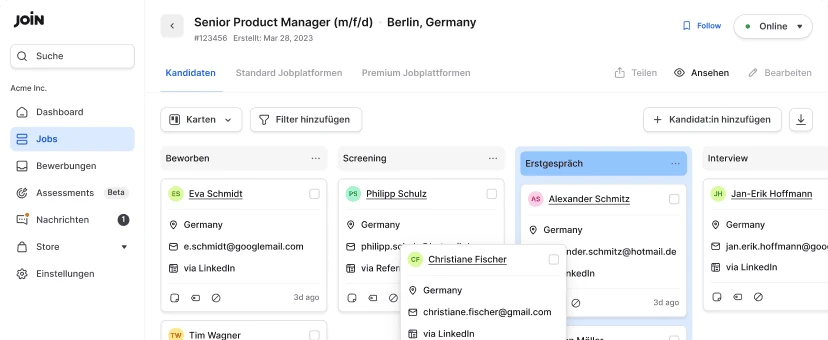Best interview questions for your hiring process
QA Tester Interview questions
QA Testers are experts at looking into the small details of code to ensure it is as clean and bug-free as possible. They will test and investigate finished coding projects to ensure it is ready for the customer or client to use.
These are the important qualities to look for in a QA Tester:
- Fluent in the coding language your team uses
- Knowledge of different types of coding techniques and formats
- Extremely detail orientated
- Great ability to work to deadlines
- Exceptional problem-solving skills
Interviewing a QA Tester
QA Testers are an essential role within any team, as they will ensure that any product or system that meets your client or customer base is of the highest quality. As the role has such a huge impact on your customer satisfaction the interview process you use needs to decipher whether they are up for the challenge.
Our example QA Tester interview questions below will help you to do just that!
How to open the job interview
Most candidates will feel a little scared or nervous before their big interview, and while this is normal it may impact the quality of your conversation. Therefore, it is also in your best interest to put them at ease.
You can quickly calm your candidate’s nerves using a couple of laidback opener questions, as demonstrated below.
Best interview questions for your hiring process
See our QA Tester job description hereFor the interview
A positive opener to start
What is your proudest moment as a QA Tester?
Why did you choose to become a QA Tester?
Behavioral Questions
Name a time a change you made when testing code greatly improved a system or product?
Tell me about the most challenging project you’ve QA tested and how you coped with this challenge?
Here you will get an idea of areas that a candidate finds challenging and how they can apply their knowledge and dedication to overcome difficulties.
Tell me about a time you made a mistake when testing a piece of code, how did you rectify the mistake and learn from this?
You’re looking for honesty and drive to improve here. Everyone will make mistakes from time to time, ensuring that a candidate can minimise the trouble caused by a mistake and learn from this is important.
Talk me through a time when a colleague has disagreed with your changes, how did you fix this situation?
QA Testers will need to have good communication and negotiation skills, as they will work with a team of developers. This question aims to uncover how they have coped with this in the past.
Soft Skills
How do you prioritise your testing requests when multiple come in at once?
This question examines a candidate’s ability to manage their time and use their prioritisation skills to keep a project running smoothly.
What steps would you take if you received a negative piece of feedback from a colleague on a piece of code you tested?
Here, you’ll get an idea of a candidate’s openness to learn from their peers and improve their future work. They should be able to name a few steps they would take to learn, such as looking out for a certain bug in future tests.
What skills do you have that help you as a QA Tester?
Here a candidate will name their relevant skills, whether soft skills or hard skills.
When explaining a bug or improvement to a colleague with less technical understanding than yourself, how do you ensure that they understand?
This is a situation a QA Tester may find themselves in from time to time, knowing they have appropriate communication techniques to navigate this is critical. They can mention giving visual examples or demonstrations, or other appropriate techniques.
Hard Skills
What is the largest project you have worked on?
Here you’ll get an idea of how well a candidate’s experience matches up with your company’s workload and project types.
Which testing tools are you most comfortable working with?
This answer will give you an idea of what tools overlap with the candidate’s history and your current working style, along with what they may need to be onboarded with.
Which coding language have you worked with most in the past?
This will give you an idea of the candidate’s compatibility with how your development teamwork.
Have you received any management or leadership training?
While this isn’t a make or break skill for a QA Tester, it is useful to know if they will be able to lead a team of developers to make better coding decisions.
Do you have any niche you’re specialised in testing?
This is a great way to find out if your potential QA Tester specialises in testing any particular products or systems.
Operational / Situational Questions
If you were required to test a product or system you had never worked with before, how would you proceed?
Your candidate should mention doing appropriate research on typical bugs or ‘untidy’ coding mistakes to look out for. They should also mention receiving a full briefing on the product’s purpose from the relevant team.
If when testing multiple pieces of code you noticed frequent similar mistakes, how would you proceed?
Here, the candidate should have the initiative and people skills to set up a meeting with the team to explain the mistake and the correct way to avoid this. They should then check the code in the months following to ensure the mistake is rectified.
Imagine your colleague asks you for an urgent testing task when you are already working on a task, what do you do?
Your candidate should take the correct steps to assess whether the task is more important than what they are working on, they should then prioritise. Informing stakeholders about the delay is also an important step.
If you were to join our team as a QA Tester, what would your first steps be?
Your candidate should mention introducing themselves to stakeholders and familiarising themselves with the work style and tools.

Start hiring and prepare your interview
All platforms are available for you to promote your job through JOIN.
Create job ad for free


This will give you an idea of the types of mistakes a candidate has picked up on in the past and what improvements they can bring to your team.